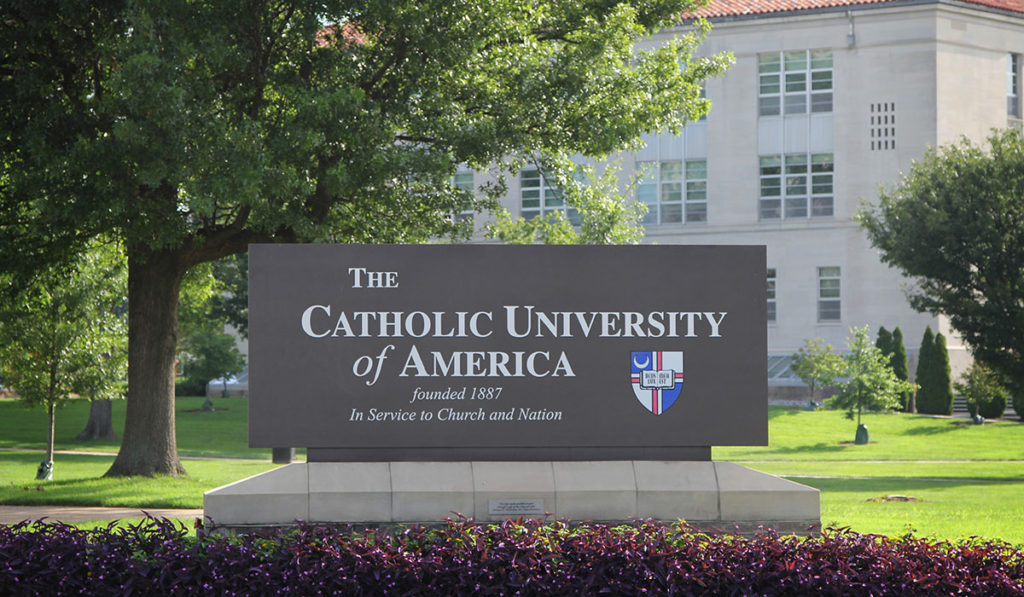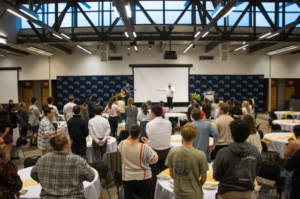Graduate Students Not Paid On Time in September Due to Transition to New Payroll System
 Courtesy of Metropolitan School of Professional Studies
Courtesy of Metropolitan School of Professional Studies
By Amanda McShane
More than 100 student workers were not paid on time at the end of September due to a new digitized payroll system and miscommunication between students, faculty and the administrative departments.
The unpaid students were informed of the late payment, which was supposed to be made on Tuesday, September 25, and told that the problem would be resolved over the weekend and checks would be delivered to their departments the following Monday.
Advocating for their graduate students, the faculty assembly sent a letter to Provost Andrew Abela and President John Garvey about the payroll situation on September 27. In the letter, faculty expressed their frustration and concern that the graduate students did not receive their merit stipends or their wages as teaching assistants, teaching fellows and research assistants. The faculty assembly called for Catholic University to:
- Issue an apology to all the graduate students before the full university community.
- If needed, hire part-time workers in Human Resources (HR) and Payroll to work overtime to get the problem in the system fixed immediately.
- Pay interest on the number of days payroll was late.
- Move the entire new hiring system into Human Resources itself and hire new employees who specialize in contracts.
Eleven faculty members signed the letter, representing seven graduate and undergraduate schools. Most faculty members became aware of the issue on Wednesday, September 26. Dr. Julia G. Young, Director of Undergraduate Studies of History, is one faculty member who signed the letter.
“I think it’s an issue of great concern any time that employees are paid late by an organization,” Young said. “Many of our graduate students, like employees across the university, are supporting families and have bills to pay.”
A statement apologizing for the processing errors was sent out by Abela and Vice President for Finance, Rob Specter. In the letter, Abela and Specter explained the new payment program used by the university and advised students not paid to contact their department dean or chair to ensure their contract has been processed.
“The problem stems from various factors, including implementation errors of a new system, compounded by some departments submitting contracts late. The contracts are needed to generate payment on schedule. We have experienced this problem at the start of prior academic years, and that is why we invested in automation to make contracts administration easier and less prone to error,” the letter read.
According to a university spokeswoman explaining the process used for contracts, a signed contract must first be submitted through HR for students to begin getting their stipends from the payroll department. This year’s new digitized system processed contracts online to decrease paper usage and save money. Several problems resulted in a number of contracts arriving late to HR this year, which resulted in late payments, in addition to the expected period of adjustment that comes from the implementation of a new payroll system.
“This is not the first time we have had problems with contracts arriving late to Human Resources, nor is it a problem unique to this university,” the spokeswoman said in an email sent on October 5.
“To address the issue, Human Resources has been cutting checks manually as contracts come in to make sure everyone is paid as soon as possible.” As of the spokeswoman’s email, all outstanding payments had been made.
With the new hiring system, graduate students had to apply for jobs they already had, causing confusion with getting their work forms and applications in on time.
Esther Hudson, President of the Graduate Student Association (GSA), along with GSA Senator Kelly Schaffer, created a survey that went to all graduate students, which found that among 173 respondents, about 60% had not been paid in full on time.
“I do think there are issues with transparency and accountability and communication with regard to what’s happening at the University at different levels,” Hudson said. “But also there’s just a systematic issue where sometimes some messages get lost.”
For many graduate and undergraduate students unaffected by the payroll issue, the new system has worked fine.
“It wasn’t a big deal, I just had to go to payroll and pick up a check, easy to deposit on my own,” one undergraduate student who works at the library said.
However, the graduate students who were affected and responded to the GSA survey felt outraged to have to wait for their paychecks, especially for those who rely on their stipends. Furthermore, the recipients had expressed that they knew a few graduate student workers who had already been struggling to pay their rent on time.
Bethany Besteman, the Assistant Director of the Writing Center, expressed her frustrations with the lack of a sense of urgency the university seemed to respond with.
“We need to be able to take care of basic needs of food and shelter to be able to continue doing the work that we do,” Besteman said. “It is very demoralizing when the university sends you the message that your hard work doesn’t matter enough to pay you your small amount of money on time.”






